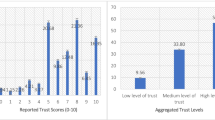Abstract
Studies examining the trends in public trust in physicians have provided a considerable amount of valuable policy implications for policymakers compared with cross-sectional studies on this topic in many countries. This study investigated changes in public trust in physicians in China based on two cross-sectional national surveys conducted in 2011 and 2016 and identified the determinants of these changes. The results indicated 83.4% of respondents in 2011 reported trust or strong trust in physicians in China, which decreased to 64.2% by 2016. The results of ordinal logistic regression demonstrated that public trust in physicians in China had decreased significantly from 2011 to 2016 (P< 0.001) after adjusting for other independent variables. Self-reported health status, self-rated happiness, and self-identified social class were all associated positively with public trust in physicians in China. The results also confirmed that decreasing public satisfaction with the most recent treatment experience was the major determinant of decreasing public trust in physicians in China. The findings of this study suggest that decreasing public trust in physicians deserves considerable attention from national policymakers and that improving satisfaction with treatment experiences would be the most effective strategy for enhancing public trust in physicians in China.
Similar content being viewed by others
References
Mechanic D. Public trust and initiatives for new healthcare partnerships. Milbank Q 1998; 76(2): 281–302
Hall MA, Camacho F, Dugan E, Balkrishnan R. Trust in the medical profession: conceptual and measurement issues. Health Serv Res 2002; 37(5): 1419–1439
MÜller E, Zill JM, Dirmaier J, Härter M, Scholl I. Assessment of trust in physician: a systematic review of measures. PLoS One 2014; 9(9): e106844
Calnan MW, Sanford E. Public trust in healthcare: the system or the doctor? Qual Saf Healthcare 2004; 13(2): 92–97
Lee YY, Ng CT, Siti Aishah MG, Ngiam JZ, Tai BC, Lim MK, Hughes K. Public trust in primary care doctors, the medical profession and the healthcare system among Redhill residents in Singapore. Ann Acad Med Singapore 2007; 36(8): 655–661
Hall MA, Dugan E, Zheng B, Mishra AK. Trust in physicians and medical institutions: what is it, can it be measured, and does it matter? Milbank Q 2001; 79(4): 613–639
van der Schee E, Braun B, Calnan M, Schnee M, Groenewegen PP. Public trust in healthcare: a comparison of Germany, The Netherlands, and England and Wales. Health Policy 2007; 81(1): 56–67
Blendon RJ, Benson JM, Hero JO. Public trust in physicians—U.S. medicine in international perspective. N Engl J Med 2014; 371(17): 1570–1572
van der Schee E, Groenewegen PP, Friele RD. Public trust in healthcare: a performance indicator? J Health Organ Manag 2006; 20(5): 468–476
Gille F, Smith S, Mays N. Why public trust in healthcare systems matters and deserves greater research attention. J Health Serv Res Policy 2015; 20(1): 62–64
Peters D, Youssef FF. Public trust in the healthcare system in a developing country. Int J Health Plann Manage 2016; 31(2): 227–241
Yip W, Hsiao W. What drove the cycles of Chinese health system reforms? Health Sys Reform 2015; 1(1): 52–61
Blumenthal D, Hsiao W. Privatization and its discontents—the evolving Chinese healthcare system. N Engl J Med 2005; 353(11): 1165–1170
Blumenthal D, Hsiao W. Lessons from the East—China’s rapidly evolving healthcare system. N Engl J Med 2015; 372(14): 1281–1285
ISSP Research Group. International Social Survey Programme: Health and healthcare—ISSP 2011 GESIS Data Archive. ZA5800 Data file Version 3.0.0 ed. Cologne 2015
Kao AC, Green DC, Davis NA, Koplan JP, Cleary PD. Patients’ trust in their physicians: effects of choice, continuity and patient perceptions of physician payment method. J Gen Intern Med 1998; 13(10): 681–686
Boulware LE, Cooper LA, Ratner LE, LaVeist TA, Powe NR. Race and trust in the healthcare system. Public Health Rep 2003; 118(4): 358–365
Haven K, Celaya MF, Pierson J, Weisskopf AJ, Mackinnon NJ. Comparison of health confidence in rural, suburban and urban areas in the UK and the USA: a secondary analysis. BMJ Open 2013; 3 (5): e002640
Armstrong K, Rose A, Peters N, Long JA, McMurphy S, Shea JA. Distrust of the healthcare system and self-reported health in the United States. J Gen Intern Med 2006; 21(4): 292–297
National Bureau of Statistics of China. Tabulation on the 2010 population census of the People’s Republic of China. Beijing: China Statistics Press, 2012
Johnnson DR. Using weights in the analysis of survey data. https://doi.org/www.nyu.edu/classes/jackson/design.of.social.research/Readings/Johnson%20-%20Introduction%20to%20survey%20weights%20%28PRI%20version%29.pdf (Accessed May 5, 2018)
Gainsbury SM, Russell A, Hing N, Wood R, Lubman D, Blaszczynski A. How the Internet is changing gambling: findings from an Australian Prevalence Survey. J Gambl Stud 2015; 31(1): 1–15
Zhao D, Zhang Z. Qualitative analysis of direction of public hospital reforms in China. Front Med 2018; 12(2):218–223
Zhao D, Hu W. Determinants of public trust in government: empirical evidence from urban China. Int Rev Adm Sci 2017; 83(2): 358–377
Zhao D, Rao K, Zhang Z. Patient trust in physicians: empirical evidence from Shanghai, China. Chin Med J (Engl) 2016; 129(7): 814–818
Kehoe SM, Ponting JR. Value importance and value congruence as determinants of trust in health policy actors. Soc Sci Med 2003; 57 (6): 1065–1075
Goold SD, Fessler D, Moyer CA. A measure of trust in insurers. Health Serv Res 2006; 41(1): 58–78
Cleary PD. Evolving concepts of patient-centered care and the assessment of patient care experiences: optimism and opposition. J Health Polit Policy Law 2016; 41(4): 675–696
Acknowledgements
This study was supported by the SMC-Chenxing Foundation of Shanghai Jiao Tong University, and Philosophy and Social Science Foundation of Shanghai (No. 2014BGL002).
Author information
Authors and Affiliations
Corresponding author
Electronic supplementary material
Rights and permissions
About this article
Cite this article
Zhao, D., Zhang, Z. Changes in public trust in physicians: empirical evidence from China. Front. Med. 13, 504–510 (2019). https://doi.org/10.1007/s11684-018-0666-4
Received:
Accepted:
Published:
Issue Date:
DOI: https://doi.org/10.1007/s11684-018-0666-4



